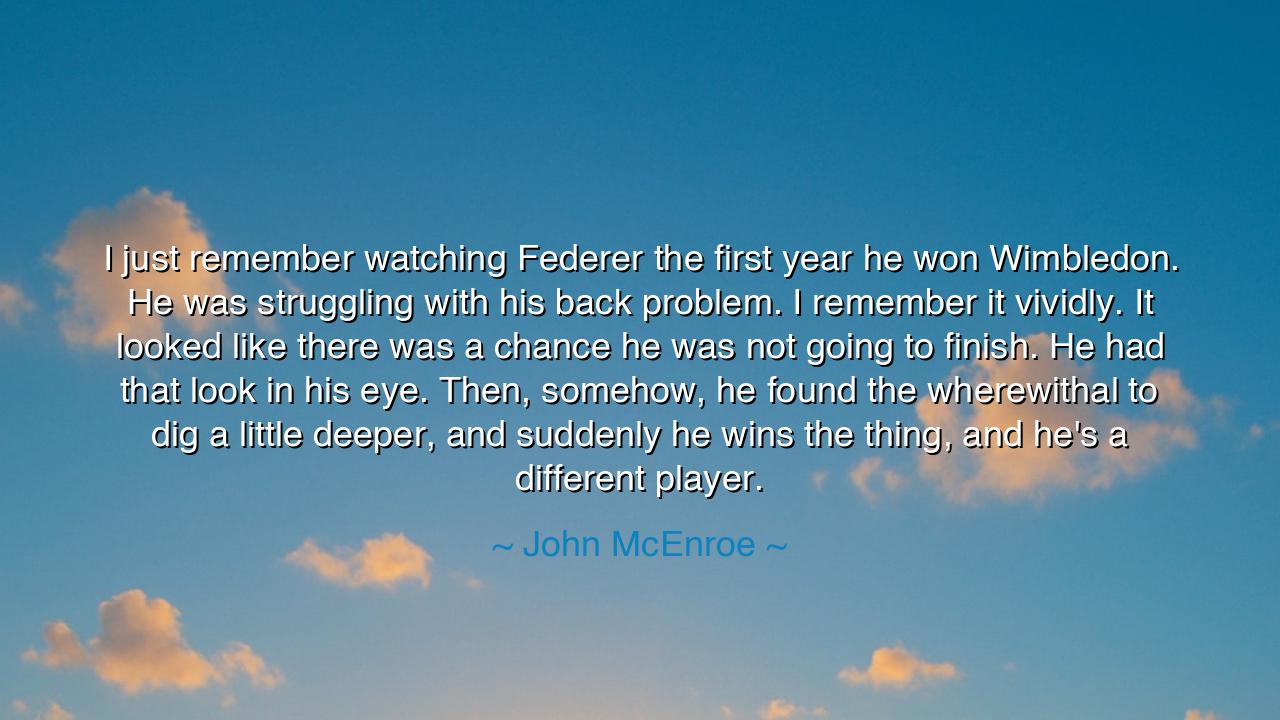
I just remember watching Federer the first year he won Wimbledon.
I just remember watching Federer the first year he won Wimbledon. He was struggling with his back problem. I remember it vividly. It looked like there was a chance he was not going to finish. He had that look in his eye. Then, somehow, he found the wherewithal to dig a little deeper, and suddenly he wins the thing, and he's a different player.






In the words of John McEnroe, "I just remember watching Federer the first year he won Wimbledon. He was struggling with his back problem. I remember it vividly. It looked like there was a chance he was not going to finish. He had that look in his eye. Then, somehow, he found the wherewithal to dig a little deeper, and suddenly he wins the thing, and he's a different player," we are reminded of a timeless truth about the human spirit: that adversity often reveals our true strength. McEnroe speaks not just of a tennis match, but of a moment in time when Roger Federer, struggling with injury and doubt, dug deep within himself and found the will to overcome. This is a reflection on the power of resilience and the courage to push through when faced with what seems insurmountable.
To witness Federer’s triumph over his physical pain is to understand the essence of mental fortitude. In ancient tales of heroes, whether in the form of Hercules or Odysseus, it is often not the outward appearance of strength that defines them, but their ability to persevere when the odds are stacked against them. Federer, in that moment, embodied this heroic resilience, fighting against both his physical limitations and the weight of expectation. In those moments when it seemed impossible, when the pain from his back injury threatened to pull him from the match, he was able to find something deeper within himself. This is the essence of courage: the ability to face what seems unfaceable and yet, in the face of all doubt, continue forward.
Consider the story of Thomas Edison, who, after many failures and setbacks, famously stated, "I have not failed. I've just found 10,000 ways that won't work." Edison’s relentless pursuit of invention, despite failures and seemingly insurmountable challenges, mirrors the kind of mental toughness that Federer displayed. Just as Edison kept testing and retrying, pushing the boundaries of possibility with each attempt, so did Federer refuse to succumb to the pain in his back. His victory at Wimbledon became a testament to the power of perseverance—digging deeper when the body and mind both scream to stop. Edison’s journey, much like Federer’s, is a reminder that true success comes not from avoiding struggle, but from embracing it and pushing through it.
McEnroe’s reflection also speaks to the transformative power of struggle. Federer was not the same player after that Wimbledon. He had been through a trial, and through that trial, he emerged stronger, more focused, and more resolute. His victory was not just a testament to his skill on the court, but to his mental toughness, to the way he had confronted his own limitations and transcended them. It was, in many ways, a rebirth—a reminder that the toughest challenges are often the ones that shape us most profoundly. Just as phoenixes rise from the ashes, so do we, in our moments of greatest challenge, have the chance to rise and become something new—something stronger and more resilient.
This is a lesson that extends beyond the world of tennis. In life, we are all faced with moments of doubt, pain, and hardship. There are times when we feel as though we cannot go on, times when it seems like the weight of the world is too much to bear. Federer’s triumph, in the face of injury, becomes a beacon of hope for all who face such moments. We are reminded that it is in our lowest points, when all seems lost, that we often find the courage to keep going, to dig deeper and reach for something greater than ourselves. This is the transformative power of adversity: it calls forth our inner strength, often in ways we never imagined possible.
In reflecting on this, we must ask ourselves: when faced with our own challenges, how will we respond? Will we crumble under the weight of difficulty, or will we choose to rise, like Federer, and find the wherewithal to push through, to discover the depth of our own strength? The lesson here is clear: difficulties are not barriers, but opportunities to transform. Every challenge we face offers us a chance to become something greater, to redefine our limits, and to discover our true potential.
Thus, as we navigate our own lives, let us remember Roger Federer’s victory at Wimbledon, not just as a triumph of athleticism, but as a powerful metaphor for life’s struggles. In those moments when we feel broken, when we believe we cannot continue, let us take a page from Federer’s book: dig deep, summon our inner strength, and keep moving forward. For it is in these moments of greatest trial that we are given the greatest opportunity to grow, to transform, and to emerge as a different, stronger version of ourselves.






AAdministratorAdministrator
Welcome, honored guests. Please leave a comment, we will respond soon